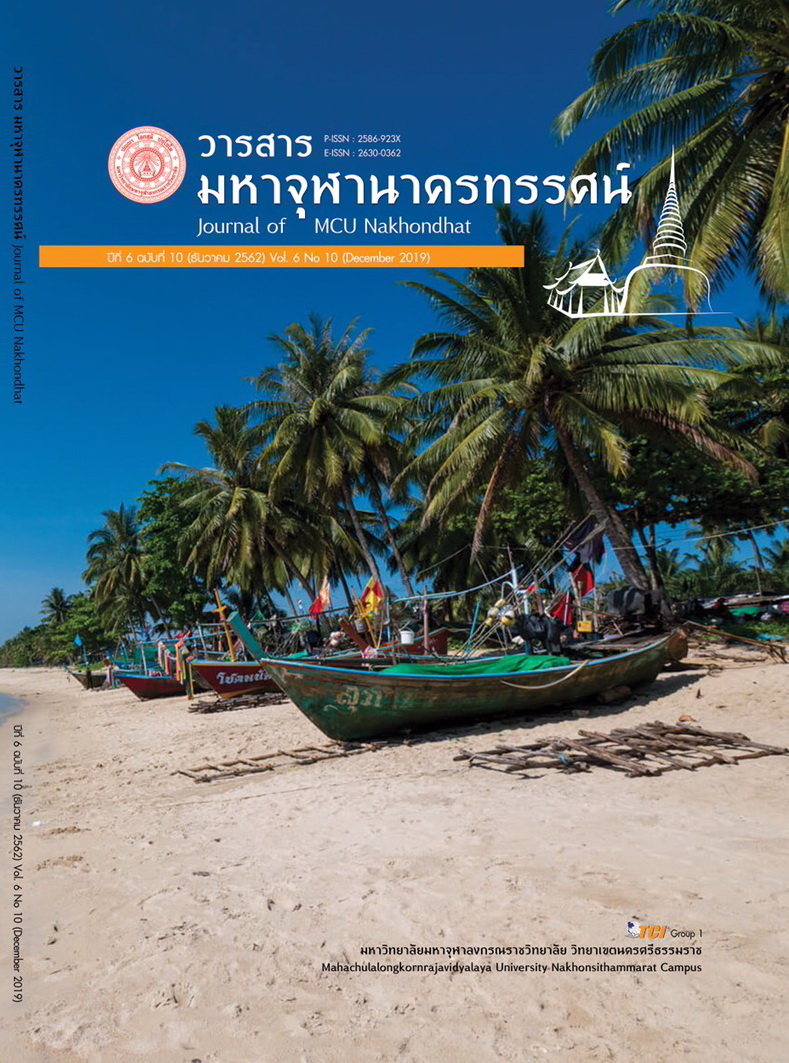BUDDHIST MONK’S ROLES IN BUILDING THAILAND’S DEMOCRATICALLY POLITICAL CULTURE IN ROIET PROVINCE
Main Article Content
Abstract
The purposes of this research were: 1) to study the role of Buddhist monks creative on the political culture of Thailand’s democracy in Roi-Et province, 2) to study the role levels of Buddhist monks creative on the political culture of Thailand’s democracy in Roi-Et province, and 3) to study the suggestions for finding out approaches to solve problems and barriers of Buddhist monks creative on the political culture of Thailand’s democracy in Roi-Et province. The study was a quantitative research, samples comprised 113 Buddhist monks from 14 temples by stratified random sampling with proportion of temples. The research instrument was questionnaires, each of which possessed the power of discrimination between .67 and 1.18, and the reliability at .926. The statistics used in data analyzing were frequencies, percentage, mean and standard deviation
The results of the study were as follows:
- their roles in creating its democratically political cultures in Roi-Et province in the overall aspect was high level. Only two aspects scaled was moderate namely their roles with communities in activities for promoting such cultures, and their participation in supporting local residents for creating them with the political culture of Thailand’s democracy.
- The level of the role of Buddhist monks creative on the political culture of Thailand’s democracy in Roi-Et province. It was found that the monk will be participation in supporting local residents for creating them with the political culture of Thailand’s democracy was moderate.
- Their problems and barriers of creating them were they are legally and obviously non-aligned to a political party, but able to recommend approaches through their religious teachings to select a decent figure for putting forward a public policy for benefits and happiness for communities; below by understanding of democratically political cultures between Buddhist monks and populace is completely contrary and the Buddhist monks have legally played no political roles at all.
The suggestions of solving problems of Buddhist monks creative on the political culture of Thailand’s democracy in Roi-Et province as follows: The Supreme Monastic Council should increasingly support Buddhist monks to participate in creating political cultures throughout the democracy; next, creating democracy for society with collaboration of every sector by focusing on policies, but not taking an individual as the main issue, but more importantly, the state must let political parties formulate policies clearly; then, the preceding council should have Buddhist monks enable to express their opinions on and play their roles in politics to help for train populace to considerably grasp democratically political cultures further.
Article Details
References
เนื่องน้อย บุณยเนตร. (2537). จริยศาสตร์สภาวะแวดล้อม: โลกทัศน์ในพุทธปรัชญาและปรัชญาตะวันตก. กรุงเทพมหานคร: สำนักพิมพ์จุฬาลงกรณ์มหาวิทยาลัย.
บุญชม ศรีสะอาด. (2543). การวิจัยเบื้องต้น (พิมพ์ครั้งที่ 3). กรุงเทพมหานคร: สุวีรินาสาส์น.
สมภาร พรมทา. (2552). พระสงฆ์กับการเมือง. วารสารพุทธศาสน์ศึกษา จุฬาลงกรณ์มหาวิทยาลัย, 16(3), 1-2.
พระครูสุจิณธรรมวินิฐ (สมจิตร อธิปญโญ). (2554). บทบาทพระสงฆ์ในการพัฒนาคุณภาพชีวิตของชุมชน: กรณีศึกษาคณะสงฆ์ อำเภอลอง จังหวัดแพร่. ใน วิทยานิพนธ์พุทธศาสตรมหาบัณฑิต สาขาวิชาพระพุทธศาสนา. มหาจุฬาลงกรณราชวิทยาลัย.
พินิจ ลาภธนานนท์. (2549). กระบวนการเปลี่ยนแปลงทางสังคมกับการปรับเปลี่ยนบทบาทการพัฒนาของพระสงฆ์นักพัฒนาในภาคอีสาน. ใน รายงานผลการวิจัย สถาบันวิจัยสังคมจุฬาลงกรณ์มหาวิทยาลัย. จุฬาลงกรณ์มหาวิทยาลัย.
ภัทรพร สิริกาญจน. (2536). หน้าที่ของพระสงฆ์ตามพุทธบัญญัติ: แนวคิดและบทบาทของพระคำเขียน สุวณฺโณ ในการพัฒนาชุมชน. กรุงเทพมหานคร: โรงพิมพ์มหาวิทยาลัยธรรมศาสตร์.
ลิขิต ธีรเวคิน. (2529). วัฒนธรรมการเมืองและการกล่อมเกลาเรียนรู้ทางการเมือง. กรุงเทพมหานคร: มหาวิทยาลัยธรรมศาสตร์.
วัฒนา สิมมา. (2554). บทบาทพระสงฆ์กับการสร้างวัฒนธรรมทางการเมืองแบบประชาธิปไตยของไทย: กรณีศึกษาในจังหวัดกระบี่. ใน วิทยานิพนธ์รัฐศาสตรมหาบัณฑิต สาขาการเมืองการปกครอง. มหาวิทยาลัยสุโขทัยธรรมาธิราช.
วุฒินันท์ กันทะเตียน. (2541). พระสงฆ์กับการเมือง: แนวคิดและบทบาทในสังคมไทยปัจจุบัน. ใน วิทยานิพนธ์อักษรศาสตร์มหาบัณฑิต สาขาศาสนาเปรียบเทียบ. มหาวิทยาลัยมหิดล.
สำนักวิชาการ สำนักงานเลขาธิการสภาผู้แทนราษฎร. (2559). วัฒนธรรมทางการเมืองแบบประชาธิปไตย. กรุงเทพมหานคร: สำนักวิชาการ สำนักงานเลขาธิการสภาผู้แทนราษฎร.
สุพัตรา สุภาพ. (2536). สังคมและวัฒนธรรมไทย: ค่านิยมครอบครัวศาสนาประเพณี (พิมพ์ครั้งที่ 9). กรุงเทพมหานคร: ไทยวัฒนาพานิช.


